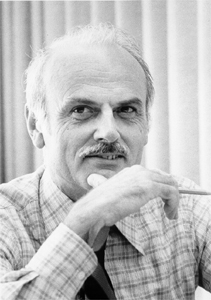- Edgar F. Codd
Infobox_Scientist
name = Edgar Frank "Ted" Codd

image_width = 150px
caption =
birth_date = birth date|1923|8|23|mf=y
birth_place =Isle of Portland ,England
death_date = death date and age|2003|4|18|1923|8|23|mf=y
death_place = Williams Island,Florida
residence =
citizenship =
nationality =
ethnicity =
field =Computer Science
work_institution = IBM
alma_mater =
doctoral_advisor =
doctoral_students =
known_for =OLAP Relational Model
author_abbreviation_bot =
author_abbreviation_zoo =
prizes =Turing Award
religion =
footnotes =Edgar Frank "Ted" Codd (
August 23 ,1923 –April 18 ,2003 ) was a British computer scientist who, while working for IBM, invented therelational model for database management, the theoretical basis forrelational database s. He made other valuable contributions tocomputer science , but the relational model, a very influential general theory of data management, remains his most memorable achievement.Biography
Edgar Frank Codd was born on the
Isle of Portland , inEngland . After attendingPoole Grammar School , he studiedmathematics andchemistry at Exeter College, Oxford, before serving as a pilot in theRoyal Air Force during the Second World War. In 1948, he moved toNew York to work for IBM as a mathematicalprogrammer . In 1953, angered by SenatorJoseph McCarthy , Codd moved toOttawa ,Canada . A decade later he returned to the U.S. and received his doctorate in computer science from theUniversity of Michigan in Ann Arbor. Two years later he moved toSan Jose, California to work atIBM 's San Jose Research Laboratory, where he continued to work until the 1980s. During the 1990s, his health deteriorated and he ceased work. [http://www.independent.co.uk/news/obituaries/edgar-codd-730256.html Edgar Codd's obituary in The Independent]Codd received the
Turing Award in 1981 and in 1994 he was inducted as a Fellow of theAssociation for Computing Machinery [ [http://fellows.acm.org/homepage.cfm?alpha=C&srt=alpha ACM Fellows] ] .Codd died of
heart failure at his home inWilliams Island, Florida at the age of 79 on Friday, April 18, 2003. [http://www.research.ibm.com/resources/news/20030423_edgarpassaway.shtml Edgar F Codd Passes Away] , IBM Research, 2003 apr 23.]Work
In the 1960s and 1970s he worked out his theories of data arrangement, issuing his paper "A Relational Model of Data for Large Shared Data Banks" in 1970, after an internal IBM paper one year earlier. [Michael Owens. The Definitive Guide to SQLite, p.47. New York: Apress (Springer-Verlag) 2006. ISBN 978-1-59059-673-9.] To his disappointment, IBM proved slow to exploit his suggestions until commercial rivals started implementing them.
Initially, IBM refused to implement the relational model in order to preserve revenue from
IMS/DB . Codd then showed IBM customers the potential of the implementation of its model, and they in turn pressured IBM. Then IBM included in its Future Systems project aSystem R subproject — but put in charge of it developers who were not thoroughly familiar with Codd's ideas, and isolated the team from CoddFact|date=September 2008. As a result, they did not use Codd's own Alpha language but created a non-relational one,SEQUEL . Even so,SEQUEL was so superior to pre-relational systems that it was copied, based on pre-launch papers presented at conferences, byLarry Ellison in hisOracle Database , which actually reached market beforeSQL/DS — due to the then-already proprietary status of the original moniker, SEQUEL had been renamedSQL .Codd continued to develop and extend his relational model, sometimes in collaboration with Chris Date. One of the normalized forms, the
Boyce-Codd normal form , is named after him.Codd's theorem , a result proven in his seminal work on the relational model, equates the expressive power ofrelational algebra andrelational calculus (which, in essence, is equivalent tofirst-order logic ).As the relational model started to become fashionable in the early 1980s, Codd fought a sometimes bitter campaign to prevent the term being misused by database vendors who had merely added a relational veneer to older technology. As part of this campaign, he published his 12 rules to define what constituted a relational database. His campaign extended to the
SQL language, which he regarded as an incorrect implementation of the theoryFact|date=September 2008. This made his position inIBM increasingly difficult, so he left to form his own consulting company with Chris Date and others.Edgar Codd coined the term "
OLAP " and wrote the twelve laws of online analytical processing, although these were never truly accepted after it came out that his white paper on the subject was paid for by a software vendor. His last work, a book named "The Relational Model for Database Management, version 2", was not so well received Fact|date=April 2008. On the other hand, his extension of the ideas in the relational model to cover database design issues, in his RM/T, have proved important Fact|date=April 2008 . Codd also contributed knowledge in the area ofcellular automata .In 2004,
SIGMOD renamed its highest prize, the SIGMOD Innovations Award, in his honor.See also
*
Codd's 12 rules
*Codd's cellular automaton
*Database normalization
*Relational Model/Tasmania (RM/T)
*Christopher J. Date
*Hugh Darwen Publications
*
*
*References
Further reading
*
*Persondata
NAME= Codd, Edgar Frank "Ted"
ALTERNATIVE NAMES=
SHORT DESCRIPTION=Computer scientist
DATE OF BIRTH=August 23 ,1923
PLACE OF BIRTH=Isle of Portland ,England
DATE OF DEATH=April 18 ,2003
PLACE OF DEATH= Williams Island,Florida
Wikimedia Foundation. 2010.
